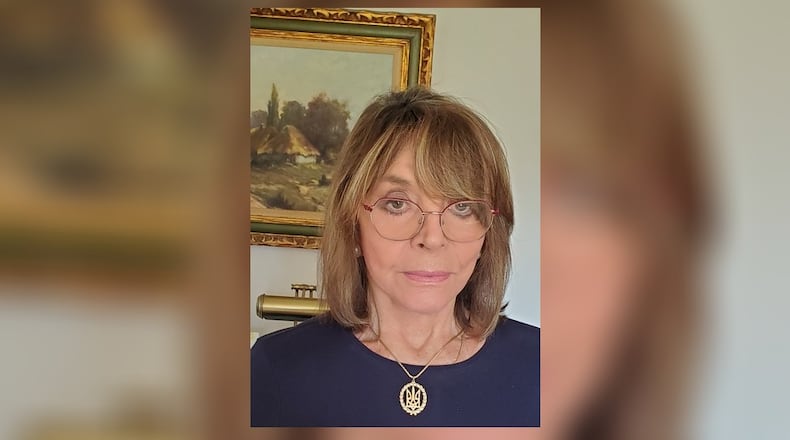The spirit of freedom is foreign to you,
We will never be even stepsiblings.
………………………………………………………………………
You’ve been fettered and chained since infancy.
……………………………………………………………………….
New commands and orders are thrust upon you —
But here, we have flames of rebellion.
You have a Tsar — we have a democracy.
No, we will never be brothers!
Translated by Tatiana Liaugminas
These are excerpts from a poem written in 2014, by a young Ukrainian woman, Anastasia Dmytruk after Vladimir Putin’s unlawful annexation of Crimea. Tragically, it is still relevant today, just more than one year after Putin’s brutal invasion of Ukraine.
The poem is a message to Russians, thus written in Russian, a language shared by both countries, and its prevalence throughout Ukraine underscores the absurdity of Putin’s contention that he had appropriated Crimea to rescue Russian speakers from murderous Ukrainians.
That absurdity however, pales in the face of his reasons for today’s war: Saving Russia by “denazifying” Ukraine, whose president is Jewish.
As the world continues to look on in horror, even Russian soldiers are reporting to their relatives that they are shocked by the reality they witness. They invaded a peaceful nation and they are fighting “enemies” who only yesterday were comrades.
Also shocking for many Ukrainians, including my relatives, was the invasion itself. As they watched Putin encircling Ukraine with thousands of Russian troops and rolling tanks through snowy fields, they did not believe that the Kremlin would attack.
And indeed, why would they? We are one people, “brothers,” according to Putin.
Thanks to geographic proximity and the inevitability of family ties, one would imagine that the connection between the two countries is, if not amicable, at least not adversarial. Yet, the relationship between Ukrainians and Russians is complex and has never been altogether harmonious despite their shared roots, linguistic similarities and reciprocal cultural influences.
From the 17th century onward, Russia was determined to erase Ukrainian national identity and language because they impeded its goal: The fusion of all nationalities within the empire into one nation. Imperial Russia denied that a separate Ukrainian culture existed and refused to acknowledge the country’s right to autonomy. Ukraine was called “Malorossia,” Little Russia, in the 19th century publication and teaching in Ukrainian were banned, and forced Russification implemented. This attempted but unsuccessful oppression of Ukraine continued until the fall of the Soviet Union in 1991. When Putin asserted that Ukraine is a part of Russia, he was echoing not only that centuries-old attitude, but something I heard from Russians all my life — there is no Ukraine, there was no Ukraine, there can be no Ukraine. I teach Russian language and literature, I have Russian friends, yet that underlying current is palpable, always.
So what are the differences between the two nations? They are profound and were clearly delineated by Boris Nemtsov, a Russian politician and dissident who was brazenly murdered February 27, 2015 in Moscow for violently opposing Putin’s annexation of Crimea the previous year. During an interview with a Ukrainian journalist, Dmitry Gordon, Nemtsov laid out three main points that underscore the differences between Ukrainian and Russian psyches and attitudes. I’m paraphrasing: ”Throughout the centuries, you (Ukrainians) were part of the Russian empire, never its center. You don’t have the “lackey” mentality, the servility. Second, you don’t have the influence of the Caucasus, (a region bordering Turkey and Iran) — hatred, cruelty and xenophobia. Third, if asked ‘Is Ukraine Europe?’, everyone will answer ‘Yes”. Russia is not, and not only geographically, but in its mentality. Russia is Eurasia and has a centuries-long tradition of autocracy which cannot be easily eradicated; it is gigantic. Even if there are attempts to abolish or stand up to oppression — dissidents for instance — they are liquidated.” The tragic irony of this last statement speaks for itself. .
Six months before his assassination, Boris Nemtsov said to the same interviewer: “We’re the two big Slavic countries. If one of us — Ukraine— manages to join the EU, it will be a beacon, a guiding star for those of us in Russia. We’ll be able to say to those in power: ‘Enough of your corrupt Byzantium. Your iron curtains, your aggression, your hatred of all living things. Here you are with your riot police and your batons — while over there is Kyiv! We don’t have the right to behave this way!’”
Tatiana Liaugminas was born after WWII to Ukrainian parents, refugees from the former Soviet Union. She’s an American citizen, with relatives in Ukraine. She teaches Russian at the University of Dayton.
.
About the Author
